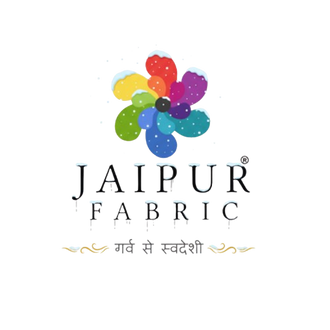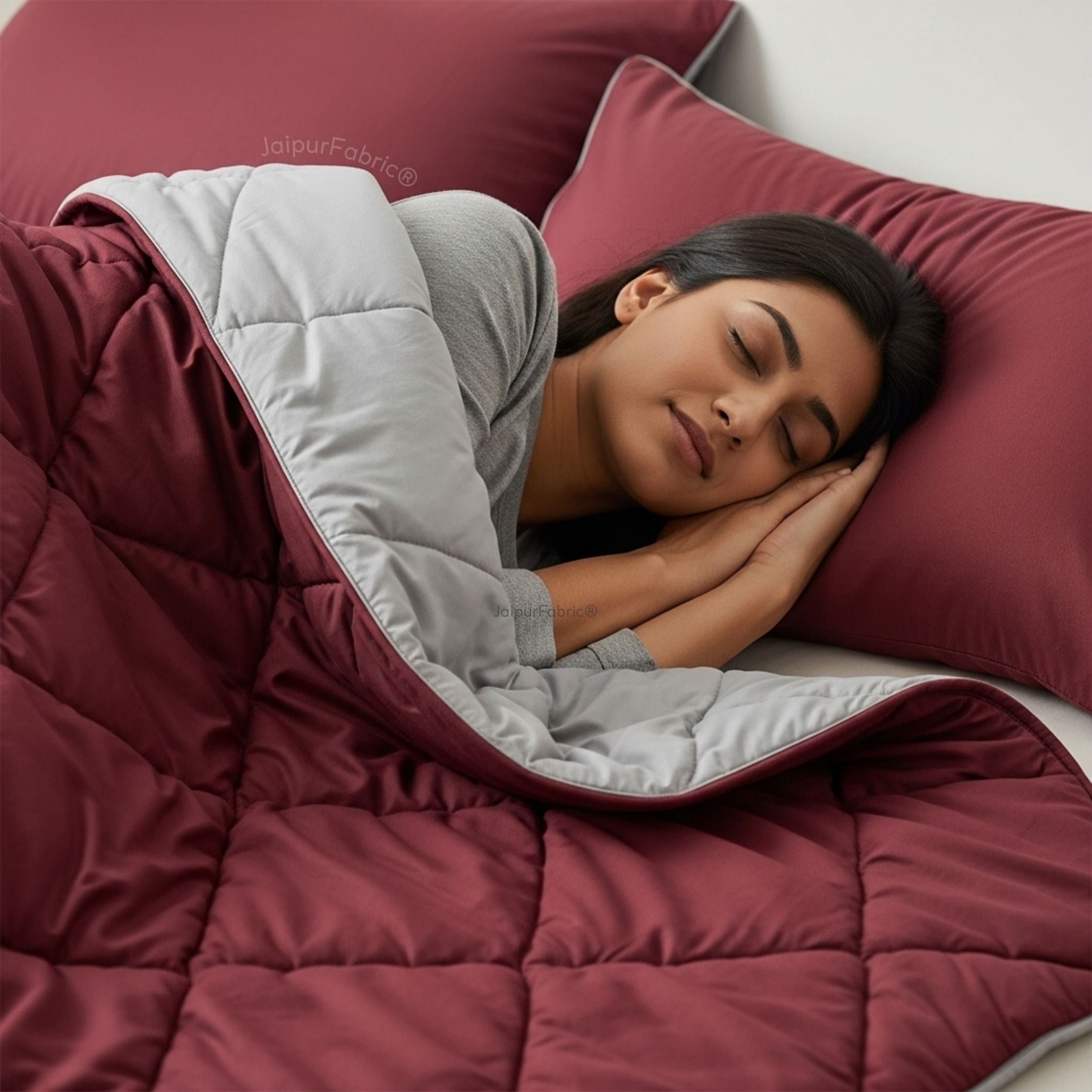Which fabric is best for bed sheets
Which fabric is best for bed sheets? All you need to know
Thinking of refurbishing your bed linen wardrobe? Why not, when an exquisite range of bed sheets are waiting to be explored at Jaipur Fabric! Yes, Jaipur Fabric is your one-stop destination for buying bed linens, and a wide range of accessories online. Wondering why? For starters, you get a chance to enhance the aesthetic elegance of your home, especially the bedroom with some legacy-inspired, culture-rich bed sheets available in dynamic patterns, colours, and materials, and surprisingly at an affordable price bracket!
Despite all said and done, bed sheet purchases are not an easy task. A plethora of aspects from the right dimension to the right pattern to the right fabric has to be considered, especially if you are buying bed sheets online. Here is a quick guide for you to choose the best bed sheet for your home that will leave you and your guests awestruck!
Many adjectives may come to your mind when you are on the quest to find the perfect bed sheet for your home. Adjectives like warmth, weight, high thread count, softness, feel, fitted sheet, etc. It can be confusing to choose from a wide variety of fabrics for your bedsheets.
What type of fabric is best for sheets is an important thing to consider. Choosing the right fabric depends on a number of factors. For example, if you are purchasing a bed sheet for use in hotels then it has to be durable so that it can withstand heavy usage. If you are getting it for your child's bedroom then it has to be soft and hypoallergenic. If it is for a newborn then it has to be the softest and the most breathable one. If it is for your guest bedroom then you need to make sure the design leaves an impression on them. All in all, a lot goes into choosing the right bed sheet and the question what material is best for bedsheets is surely a must to ponder over!
Preferences are quite subjective and remain the same when it comes to bedsheet choices. Your preferences might be clear from the beginning - you may prefer easy to wash, durable and sheets with high thread count. Some might prefer highly durable, heavy-duty sheets, which can endure frequent laundry, and ironing sessions. And, vying for breathable, soft, and hypoallergenic sheets is a must. Here are some key aspects that you must consider while choosing bed sheets.
More about higher thread count
The number of horizontal and vertical weaves per square inch is referred to as the thread count of the woven fabric. Usually, people look for the highest possible thread count to make sure that their bed sheets last a long time. A quality bedsheet will have a minimum of 200 thread count at least. Top notch bed sheets possess about 250-300 thread count. And the best sheets in the market have a thread count from 600 to upwards of 1500 thread count. Obviously a 1500 thread count bed sheet is overrated.
Climate, humidity play a role in how your bed sheets feel. You need a space to dry them properly and also a dryer that will be a necessity in monsoons.
The vast type of fabrics
Many might wonder which fabric is best for bed sheets? There are a vast number of fabrics such as cotton, silk, Tencel, etc. to choose from. Cotton and polyester fabrics are available in a myriad of variations and then there are silk, Tencel, and other fabrics.
Cotton:
Cotton is the most common, durable, and easily available bed sheet fabric available in the market. They are great for summer use. Cotton has a lot of sub divisions, let us look at all of them one by one.
- Egyptian cotton: It is known for its ultra-soft feel and has numerous benefits. The extra-long fibres add to the feel of the material and durability, thus, producing a stronger and better weave. Prices of Egyptian cotton sheets are on the higher side, however, it's worth every penny.
- Pima cotton: This is a high end cotton and is much longer than regular fibres. Pima cotton is known widely for its soft feel. Such sheets are very durable and wrinkle resistant. Pima cotton is a high end material that you can choose for your bed sheets.
- Upland Cotton: Upland is a short or medium stapled cotton typically grown in the US. This is relatively cheaper than the Egyptian, and Pima cotton variants.
- Supima cotton: Supima cotton accounts for less than 1% of the world's entire cotton growth. This is in no way a cheap material and is known for its softness, weave strength and color retention. The extra long fibres help in making supima cotton so good.
- Micro cotton: Micro cotton is of premium quality that is woven in extended loops that make it soft and adds a luxurious feel to it. There are lighter versions of the same available in the market, weight is similar to those of Egyptian cotton.
- Cotton jersey: Cotton jersey is a stretchable and soft kind of fabric. It is a single knit cotton material. Sheets made of this material are soft, stretchable and aren't that costly either.
- Percale cotton: Cotton sheets with the tightest weave are known as percale sheets. Percale sheets are known to be elegant and very smooth. The word percale refers to the type of weave it is woven in and not the material that is used to make it.
- Combed cotton: A soft version of regular cotton is manufactured by treating the fibres before spinning. Combed cotton generally requires more work and this results in better quality and is more expensive than regular cotton.
- Flannel: Flannel is a unique fabric, it is of soft weave with varying fineness. Carded wool was initially used to obtain flannel. With time cotton, wool or worsted yarn became the source of this material. Flannel can be brushed to obtain extra softness.
- Blended cotton: When you need a number of characteristics from a single material that is when blended cotton fabric comes into play. Elastane and polyester are mixed with it to make it stretchable and to provide the soft feel.
Polyester:
Derived from air, petroleum, water and coal, polyester is a coal derived synthetic fiber.
- Microfiber: Microfiber polyester is much finer than polyester and can be thermoset or thermoplastic.
- Nylon: Nylon is a lightweight polyester that is durable at the same time.
- Acrylic: Acrylics are fibers obtained synthetically from cellulose and petrochemicals. This material lasts long in rough conditions.
Tencel:
Tencel is a kind of rayon that has cellulose fibres made from wood pulp while wet spinning it. It is made of recyclables and is as smooth as silk sheets, helpful for people with sensitive skin.
Bamboo:
Bamboo is a wide known natural fiber. Bamboo sheets are low maintenance and can last really long.
Linen: Flax plants are used in the textiles industry to manufacture linen. Linen sheets are very durable and dry quicker than cotton. And are very strong and long-lasting.
Silk:
Silk is made from the cocoons of silkworm through sericulture. Silk is known for its appearance and soft feel.
FAQsWhich one to buy?
This is something you will have to find for yourself, we have listed all that you possibly need to know about fabrics of bed sheets. Be it sheets with plain weave, sheet sets or 100% cotton sheets or upland cotton sheets; you can find it all.
What is the best fabric to make bed sheets?
Cotton is the prime choice of fabric to make bedsheets that are not only soft, comfortable, durable but also hypoallergenic, and environment-friendly.
What is the most durable fabric for sheets?
When it comes to durability, cotton is the best fabric. Fabrics derived from bamboo, silk, and other natural fibres are also durable but lesser compared to that of cotton.
What are the most comfortable bed sheets?
Bedsheets made of premium cotton, cotton-blend, and other natural fibres are the most comfortable ones. They are super breathable, offer a feather-light touch, durable, and come with sweat-wicking, and heat insulation attributes.
Now that you are familiar with the best fabrics for bed sheets, check out the extravagant collection of supreme bed sheets at Jaipur Fabric right away!




















